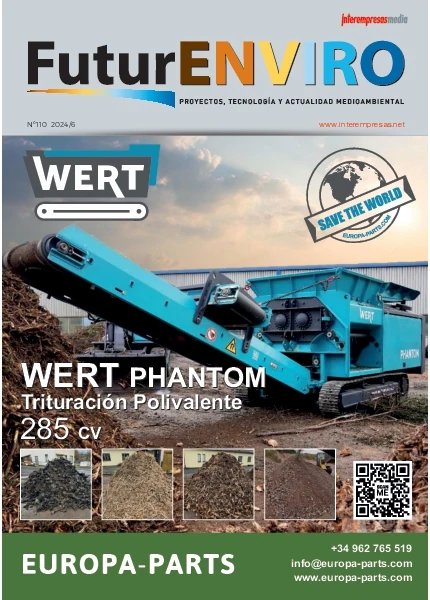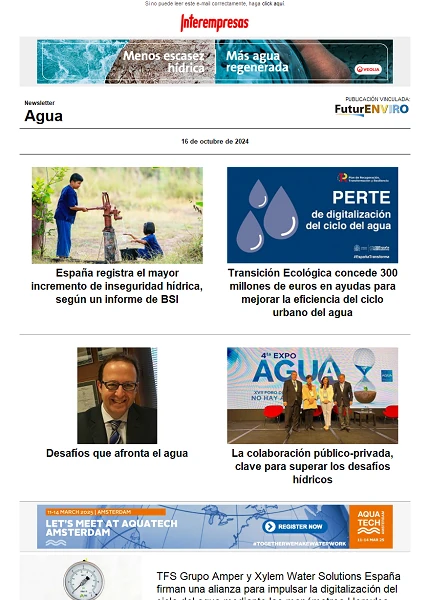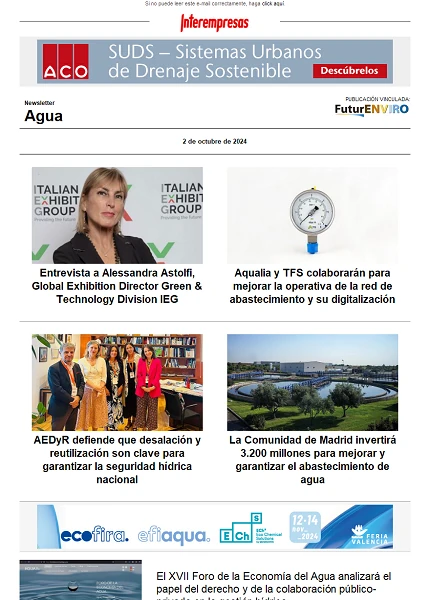Interview with Josep Puxeu, Secretary of State for water and Rural Environment
March 6, 2009
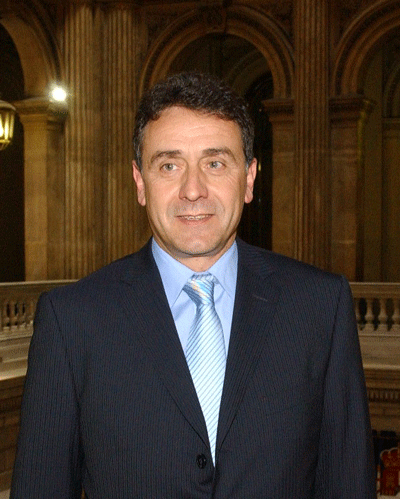
Recently, the CAP for the next four years, has approved with a cut in direct aid to farmers. What assessment is done from the Spanish Government?
The agreement on the 'health check' of the cap of the November 20 is a very important perspective change because he is recognized explicitly the strategic nature of agriculture, agricultural economic activity strengthens and consolidates direct aid to farmerswhich altogether provides a good framework of stability for professionals until 2013. I.e., it has served, among other things, to verify that the CAP far from diluted becomes an effective instrument at the service of the Spanish and European agriculture, that is becoming more competitive. Spain keeps its budget tab and, in addition, we have managed that approximately 200 million that were now not coming into the sector can spend them on specific active policies of the first pillar.
Do you think that the Spanish Agriculture, both in infrastructure and competitiveness, is healthy to meet with the so-called 'Horizon 2020' guarantees? What are the challenges?
Spanish Agriculture, despite the necessary adjustments to always be done in one or another sector, is very competitive, so it is able to face the future with so many assurances or more than any other productive sector. In these times of crisis, the careful work of professionals in the field is demonstrating that we are on the right track because the sector maintains stability in production and employment when other sectors, much more media such as the automotive industry or the industrythey are going through really difficult situations. Agri-food are the first manufacturing sector of the country. The food industry in the year 2008 has surpassed the 80,000 euros of turnover, the trade balance remains in positive terms and continues to maintain the employment. In short, the agricultural and agri-food sectors are strategic from the point of view of self-sufficiency, but also from the point of view of social cohesion, rural development because they set the population in rural areas and promote the socio-economic development of these areas. Therefore, our bet is going to be supporting this sector with the lines of aid that we already have in place in r & d, an effort that we must keep to improve competitiveness, with aid for the promotion and exportswith the opening of new markets and the defence of our productions in relation to sales of third countries, marking entry prices, schedules and contingent.
In the sector of fruits and vegetables, Spain is now the first country in the world to export. Organizations such as the Fepex just ask the Government measures to improve the competitiveness of fruit and vegetables Spain. To what extent can the Spanish Government support them?
Well, as it could not be otherwise, a sector as dynamic and vocation for the future as the fruit and vegetables has the strong support of the Government and one of the key elements to remain leaders is the promotion and the opening of new markets.
With regard to the promotion from the Ministry we are carrying out a wide range of actions such as, for example, the institutional campaigns to disseminate the nutritious and healthy aspects of the fruit that we are developing in collaboration with the Spanish Agency for food safety and nutrition, or the campaigns financed with EU for the consumption of fruit in schools. Also we carry out different specific campaigns and participate in international fairs, such as the latest edition of the Fruit Logistica in Berlin, the most important fair in the world for the sector, where I could see once again the important commitment of our producers for continue to fight to open and maintain new markets. Always say that you we have to support the sectors that have difficulties, but more so to those who work and throw the economy and employment as in the case of the fruit and vegetable sector.
The livestock sector has in recent years modernized their farms to improve the quality. They have been large investments, and therefore fear the arrival of measures such as liberalization of the milk market by 2015. Are they, in his view, sufficient reasons to express these fears?
To the contrary. Investments in quality in the liberalisation of the market will have its best ally to monetize them. We believe that quality is synonymous with of competitiveness and, that is what it is when we talk about a market in an increasingly globalised scenario-oriented production.
One of the major advantages of the Spanish dairy production sector is giving value and relevance to the European model of production precisely by the great demands of quality, health, animal welfare and respect for the environment has. It is a model, the European, which should be an opportunity if we move it to the consumer as an added value inherent in the products of the EU.
As a marketing strategy focused to the production of milk in specific geographical areas, we are making significant efforts to enhance the production and marketing of products with added value linked to different production systems protected designations of origin, protected geographical indications (PGI), ecological production, certified quality marks, etc.
One of the major complaints of the Spanish field has always been the low price paid for the raw material to the farmer and the high price paid for the same product by the end consumer. Does reason the farmer in the endemic complaint? Are the margins of the middlemen really so high?
With the creation of the new organizational structure of the Ministry has created a new unit dealing with analyzing the components of the supply and demand in the various stages of the food chain and the dialogue between the different components of this chain, from production to the consumer. It is essential that each component know the business of the other and is to develop synergies.
One of our main objectives is to promote transparency in the information on the food market. And we believe that a good instrument are specific studies to highlight the process of formation of the value chain and enhance the information to the consumer. Currently, studies of the various chains of value, for citrus fruit and some fruits and vegetables are being designed. This work will define models of different value chains and identify, for each link, a fork of the costs that affect the formation of such prices.
In what way can affect the crisis to the agricultural machinery sector? Do after finishing the previous plan of aid for the renewal of tractors and machinery in the Spanish field, arises the Ministry to launch a new 'Plan Renove'?
In the year 2008 as a whole cannot be said that the crisis has had a major impact on the domestic market of agricultural machinery. If we take as a reference the registration of machinery in the official records, the total number of machines registered in 2008 was around 1 per cent higher than the 2007. However, data from the last quarter of the year indicate a moderate fall in the machinery, by what they consider it necessary to maintain the line of the Renove Plan, which so far has worked well. The assistance will continue this year with the same requirements of the previous year, and I know that in several autonomous communities already are materializing and paying claims approved in the year 2008.
No doubt investment in research and development has become in recent years in hallmark of an industry for the future. What budget allocated his Ministry in technology this year both in agriculture, livestock as food industry? And what are the main projects?
Through the Directorate General of industry and markets food we are working actively in the development and implementation underway in several agri-food technology centres, according to a policy which aims to diversify the quality of the food products and enhance the confidence of consumers and to promote the modernization of the industryits technological development, its environmental suitability and its presence in the international market.
Oleic and wine-making sector has grown a lot in recent years, so it also needs a promotion of these products at the international level. Are campaigns conducting in this regard?
As in the sector of fruits and vegetables which we have already discussed, these two other sectors are also characterized by our position of world leadership, and in the same way the international promotion is an essential tool.
Specifically for the wine sector are developed and co-finance various types generic promotion activities, mainly aimed at reporting on quality wines psr wines produced in nationwide that will encourage a greater understanding of the sameboth of the different varieties of quality wines, and their conditions of production, as well as aspects related to wine culture and tradition.
In this regard, the Ministry publishes information material on wines with DO in several languages, working since 2006 with Turespaña and Acevin (Association of wine cities) to promote 'Spain wine routes' and have agreements with ICEXIFLA, the Agro-alimentarias cooperative, chambers of Commerce and the bodies responsible for promotion of the autonomous communities, which cover specific activities for Spanish wines as presence in trade show, support to importers, training, development of product catalogues etc.
With regard to the olive oil sector their intrinsic characteristics provide you with a leadership position that we must maintain and reinforce. This year, the Ministry intends to conduct a study on the best strategy to improve the promotion of oil both in national and international level and we are going to maintain our participation in food fairs or our collaboration with the Spanish Foundation of the Mediterranean dietnot to mention the prize "Best Aceite de oliva virgen extra Spanish" that every year we call from the Ministry."" Also, must be borne in mind that the olive Spanish oil interprofessional organization has among its purposes the promote and disseminate knowledge of this product, and, in the last examination of the EU for campaigns of promotion in the internal marketthe interprofessional has presented the programme entitled "European agenda for olive oil", which has been forwarded to the European Commission for approval. This program will help us to increase the consumption of oil within the considered new consumers, Member States and also consolidate and encourage its consumption in the Member States already consumers and get (doctors and restaurateurs) opinion leaders to promote their consumption.
A new European legislation that restricts the use of many of the pesticides used in the Spanish field has been approved. How long will our farmers to adapt to it and how may affect them the development of their crops?
Indeed, the past February 13 was reached agreement on a new regulation to regulate marketing of plant protection products on. During their processing is had generated some alarm in the sector by the withdrawal of active substances that could lead to, but it is important to note that finally taken a text in line with what had been agreed in the Council and that, in practical terms, means that most of the criteria finally adopted were already implemented currently in the process of evaluation of active substances and plant protection products. In addition, the new regulation provides for exceptions and transition periods for the withdrawal of the active substances which have no viable alternatives, which gives a reasonable margin for these alternatives.
I would like to point out that a directive on the sustainable use of pesticides, which shall be implemented through a National Plan of action on par with the marketing of plant protection products regulation has been adopted. This plan, whose first actions have already begun, will be the frame of reference for the use of plant protection products in the coming years.
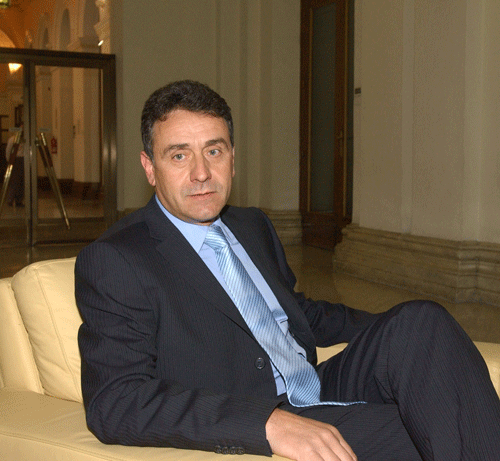
Then it should be the same guarantees as regards the use of pesticides to products coming from outside the EU and which might constitute a direct competition to the Spanish farmer required?
It is therefore a matter of reciprocity, establish the same requirements and health guarantees to products coming from other countries than to Community products. It is essential to resolve this issue so that European agriculture can maintain its competitiveness. We must harmonise the legislation on plant protection at the international level to promote the guarantees for health and environment to be extended to all over the world.
In 2008, the meat industry increased exports by 23%. Is one way of ensuring the growth of the companies in the sector opening up to the Asian market and emerging countries?
It is a fact that meat Spanish exports, mainly of pig, aimed at non-EU markets, have been growing at a very high pace in the last five years. This demonstrates the growing interest of companies access to foreign markets.
We must not forget that the meat industry, with 20% of the total industrial production, is the first sector of the Spanish food industry.
Spanish industries in the meat sector in recent years have made a great effort to be competitive and have opted to make dimension, invest in r & d, with consequent improvement of products and their presentations and the corresponding increase in value added andTherefore, with the prospect that their products are sold in new markets, such as the Chinese and other Asian countries.
In China, after arduous negotiations, we open up the market, which has more than 1.3 billion consumers, to our meat products in August 2008. Since then, we have eight meat industries exporting our products there, and that certainly can be, we are going to support our industries so that they can take advantage of this great business opportunity.
Biofuels and their involvement in the agricultural world
Coinciding with Expobioenergía, you defended the production of biofuels as a great opportunity to strengthen agriculture and rural development. In what sense can help the Spanish field?
Last year we heard criticisms directly related to the production of biofuels, claiming that they were the main cause of the rise in food prices. The truth is that this rise has had more to do with the price of oil and its impact on fertilizers or to transport the production of biofuels. Proof of this is that the price of rice rose also unconscionable way and with rice, as you know, biofuels are not.
Biofuels can be a good alternative for those areas that have special difficulties with some crops. We are going to maintain the commitment to support the production of biofuels and maintain the goal for 2010 in automotive fuels 5.83 per cent comes from biofuels, because they are a chance to strengthen agriculture and rural development, that help set the population to reduce the energy dependency of oil and combat global warming and air pollution to be cleaner fuels and, therefore, to fulfil the commitments of the Kyoto Protocol.
What are the objectives of the Spanish Government with regard to the empowerment of the biomass as an additional source of energy production?
Our commitment is to increase the energy use of the forest remains because there is no doubt that the energy use of woody debris from different operations of short and improvement of forests brings important benefits, both by the decline in the consumption of fossil fuels by a source of renewable energy and their consequent contribution to fight against the climate by reducing the risk of forest fires.
This commitment by the Ministry is reflected in the budgets of this year with a party of 12 million euros to carry out projects for the use of residual forest biomass. In addition, we are preparing a document, "Strategy for the energy use of residual forest biomass", in collaboration with the administrations concerned, to see there are difficulties to achieve a greater use of residual forest biomass energy.
On forestry policy, at the beginning of this legislature approved a plan to plant 45 million trees in an area of 61,000 hectares with species appropriate to each natural environment. How is developing this plan and what are the next challenges to fight for the preservation of our forests?
Indeed, last summer presented the 45 million trees planting project which we are going to spend 90 million euros in all the legislature. From year 2004 to 2008, the budget that we spend on forest policy has grown 73%, and already this year, the budget calls for an increase of the allocation to the end of 11.276.000 euros. It's a boost to the performances of repopulation that we have been doing for years.
Initially we provided that the works are located in economic fields and in public domains managed by the General Administration of the State as well as mountains of local corporations, susceptible of resettlement areas have been selected and it is already underway in the drafting of the relevant projects. With this Plan we want to improve the fight against erosion and desertification in our territory, to help curb climate change, recover and increase biodiversity and promote sustainable rural development.
Spain lived a critical situation with regard to the supply of water last year, affecting both individuals and farmers. What measures would take his Ministry to solve water problems in case of repetition of this situation? It is the abandonment of the culture of irrigation by flooding one of them? Are shifts still totally unthinkable in such cases?
Fortunately this year it rains and snows. It is true that last year we live some difficult situations in some areas, but apart from these situations point as the live in Barcelona, we are working on what we call a basket of supply, i.e. in the quality of the watersdesalting, reuse and purification according to the water framework directive.
On the other hand this year approved the plans of basin where they have to establish the water needs of each river basin and the availability of each of them with criteria of sustainability and cost recovery andof course, in the modernization of irrigation, which is the key to saving on consumption.
The modernization of irrigation remains a priority. As it cannot be otherwise the Ministry is making a major investment effort in all these lines of action that I am commenting on. To give a piece of information, average investment of the Ministry in the field of water is around 2 billion euros per year. We must improve the quality of the water, must find alternative supplies to areas that lack this resource, must increase the reuse and improve the debugging and need to improve efficiency in the management and use of this resource so little as vital for the development. Finally, in relation to shifts, as we have been saying, not us closed to any solution provided that it is socially accepted, economically viable and environmentally sustainable.



